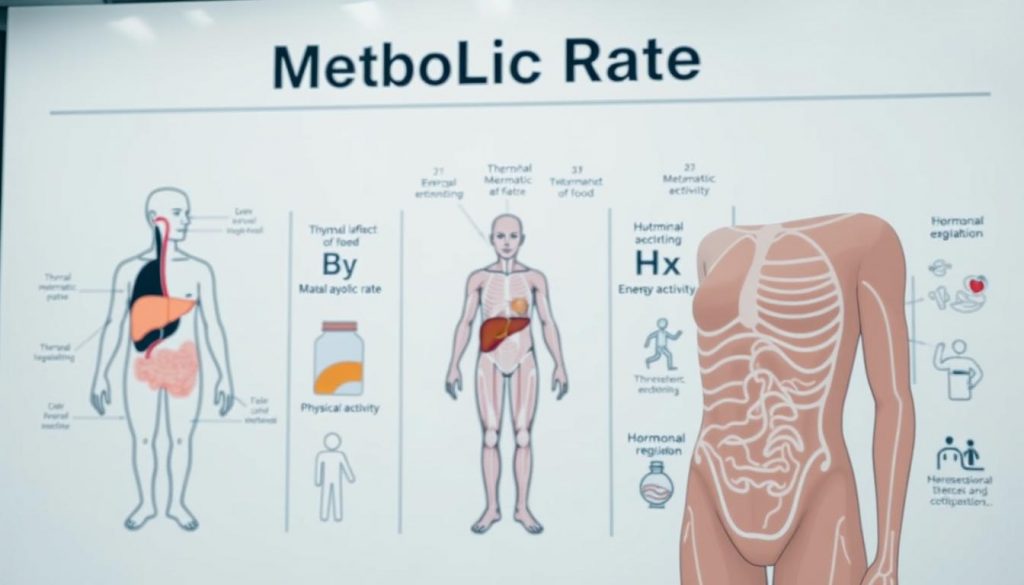Have you ever wondered why some people seem to eat whatever they want and still stay slim? The answer lies in their metabolic rate, the body’s engine that converts food into energy and burns calories even at rest. Understanding how to support your metabolism can be a game-changer for your energy levels and weight management.
Metabolism is the process by which your body transforms food into the energy needed for essential functions, from breathing to moving. A higher metabolic rate means your body burns more calories, even when you’re resting1. Simple lifestyle changes, such as incorporating the right foods, staying active, and getting enough sleep, can make a significant difference.
For instance, standing or walking regularly can lower cardiometabolic risk factors, including weight and blood pressure2. Even small adjustments to your daily routine can add up over time, helping you maintain a healthy weight and feel more energized.
Table of Contents
Key Takeaways
- Incorporate protein-rich foods to increase energy expenditure during digestion.
- Stay active with regular movement to support your metabolic health.
- Prioritize quality sleep to avoid disruptions in your metabolic processes.
- Hydration is essential for maintaining an active metabolism.
- Maintaining lean muscle mass is crucial for a higher metabolic rate.
Understanding Metabolism and Its Impact on Health
Metabolism is the body’s engine, responsible for converting food into energy and sustaining life. It’s a complex process that includes two main phases: anabolism and catabolism. Anabolism focuses on building and storing energy, while catabolism breaks down nutrients to produce energy3.
The basal metabolic rate (BMR) is a key component of metabolism, representing the calories your body needs to function at rest. Factors like age, muscle mass, and body composition influence BMR4. For example, individuals with more muscle tend to have a higher BMR, burning more calories even when inactive.
Understanding these aspects helps appreciate how metabolism affects overall health, from energy levels to weight management. By supporting your metabolic health, you can enhance your body’s efficiency and well-being.
How We Can Naturally Increase Our Metabolic Rate
Enhancing your metabolic rate can be achieved through simple yet effective lifestyle adjustments. By incorporating regular physical activity, maintaining a balanced diet, and making mindful daily choices, you can support your body’s energy-burning processes. These changes not only improve how your body functions but also contribute to overall health and vitality.
Lifestyle Changes for a Better Metabolic Rate
Regular exercise plays a crucial role in elevating your metabolic rate. Activities like high-intensity interval training (HIIT) and strength training are particularly effective. HIIT can keep your metabolic rate higher for longer after exercise5, while strength training helps build lean muscle mass, which burns more calories even at rest6.
Diet is another key factor. Eating protein-rich foods can increase energy expenditure during digestion due to the thermic effect of food (TEF)6. Additionally, staying hydrated and avoiding crash diets are essential for maintaining a healthy metabolic rate. Even small daily changes, like taking more steps, can make a difference over time.
By focusing on these strategies, you can create a routine that supports your body’s natural processes, leading to increased energy levels and improved overall health.
Metabolism boost: Key Dietary Strategies
Diet plays a crucial role in how efficiently your body burns calories. By making informed food choices, you can support your metabolic health and enhance your energy levels. Let’s explore two key dietary strategies that can help you achieve this.
Eating High-Protein Meals for Optimal TEF
Protein-rich foods are among the best choices for supporting your metabolism. When you eat protein, your body spends more energy digesting it compared to carbohydrates or fats. This process is known as the thermic effect of food (TEF), and it can increase your calorie burn by 20–30%7. Incorporating lean proteins like chicken, fish, or tofu into your meals can help maintain lean muscle mass, which is essential for a higher metabolic rate. For active individuals, getting 1.2 to 2 grams of protein per kilogram of body weight daily is recommended8.
Adding Spicy Foods for an Extra Kick
Spicy foods, particularly those containing capsaicin, like chili peppers, can give your metabolism a mild boost. Capsaicin increases thermogenesis, helping your body produce more heat and burn additional calories. While the effect is temporary, incorporating spicy foods into your diet can add up over time. Pairing these foods with a balanced diet can enhance their benefits, making your meals more effective at supporting your metabolic health.
| Food Type | Calorie Burn Benefit | Recommended Intake |
|---|---|---|
| High-Protein Foods | Increases TEF by 20–30% | 1.2–2g per kg of body weight |
| Spicy Foods | Temporarily boosts thermogenesis | Incorporate 1–2 servings daily |
As part of a comprehensive weight loss plan, these dietary strategies can make a significant difference. For more effective strategies, visit this resource to explore additional tips and products that can support your goals.
Exercise: HIIT, Resistance Training, and Beyond
Regular physical activity is a cornerstone of a healthy lifestyle, and when it comes to supporting your body’s energy-burning processes, certain types of exercise stand out. High-Intensity Interval Training (HIIT) and strength training are two effective ways to elevate your metabolic rate and build lean muscle, which naturally burns more calories even at rest9.
High-Intensity Interval Training Explained
HIIT involves short bursts of intense exercise followed by brief periods of rest. This type of training not only saves time but also offers significant benefits. For example, a study found that HIIT can elevate your metabolic rate for hours after exercise, helping your body burn calories long after the workout is done10. Additionally, HIIT has been shown to improve insulin sensitivity and reduce blood sugar levels, which is particularly beneficial for those with Type 2 diabetes or prediabetes10.
Strength Training to Build Lean Muscle
Resistance and strength training are essential for building lean muscle mass, which is a key factor in maintaining a higher resting metabolic rate. When you engage in strength training, you’re not just building muscle; you’re also enhancing your body’s ability to burn calories. Plus, consuming protein after your workout supports muscle repair and growth, further supporting your body’s energy-burning processes9.
| Exercise Type | Benefits | Recommended Frequency |
|---|---|---|
| HIIT | Improves insulin sensitivity, elevates post-exercise metabolism | 3-4 times per week |
| Strength Training | Builds lean muscle, increases resting metabolic rate | 4-5 times per week |
By incorporating HIIT and strength training into your routine, you can create a powerful combination that supports your body’s natural processes, leading to increased energy levels and improved overall health. Remember, consistency is key, and even small adjustments can make a big difference over time10.
The Role of Sleep and Stress in Metabolic Function
Sleep and stress are two critical factors that significantly influence your metabolic health. While sleep supports your body’s ability to regulate hormones, stress can disrupt this balance, leading to potential issues like a slower metabolism. Understanding how these elements interact can help you maintain a healthier metabolic function.
Impact of Sleep on Hormone Regulation
Getting adequate sleep is essential for maintaining proper hormone regulation, which in turn supports your metabolism. Research shows that insufficient sleep can lead to increased levels of ghrelin, the hunger hormone, and decreased levels of leptin, the appetite-suppressing hormone11. This imbalance can result in increased hunger and calorie intake, potentially leading to weight gain and a slower metabolism.
A study found that short sleep duration is linked to a 38% increase in obesity in adults, highlighting the importance of adequate rest11. Additionally, sleep deprivation can disrupt the balance of other hormones, including insulin, which is crucial for blood sugar regulation. This disruption can lead to insulin resistance, a key factor in the development of type 2 diabetes12.
Techniques for Managing Stress Effectively
Chronic stress can have a profound impact on your metabolic health by altering hormone levels and increasing the production of cortisol, a stress hormone. Elevated cortisol levels can lead to increased fat storage, particularly in the abdominal area, and contribute to a slower metabolism13.
To manage stress effectively, consider incorporating mindfulness practices such as meditation or deep-breathing exercises into your daily routine. These techniques can help reduce cortisol levels and promote a healthier metabolic function. Additionally, engaging in regular physical activity can help alleviate stress and support overall metabolic health.
By prioritizing sleep and effectively managing stress, you can create an environment that supports your metabolic health, leading to increased energy levels and a reduced risk of chronic diseases.
Hydration and Metabolism: How Water and Tea Help
Staying hydrated is essential for maintaining a healthy metabolic rate. Water plays a crucial role in various bodily functions, from digestion to energy production. Even mild dehydration can slow down your body’s processes, making it harder to stay energized and focused14.
Benefits of Green and Oolong Tea
Green and oolong teas are more than just tasty options. They contain caffeine and catechins, which can enhance fat oxidation and support your body’s energy-burning processes. A study found that participants who drank oolong tea experienced increased fat burning compared to those who drank water alone15.
Water Intake and Fat Oxidation
Drinking enough water is vital for maintaining proper metabolic function. Research shows that even mild dehydration can reduce your body’s ability to burn fat, leading to a slower energy body process. For example, a study found that participants who drank 200–250 mL of water after meals lost more weight compared to those who didn’t16.
Additionally, replacing sugary drinks with water or tea can significantly reduce sugar intake, which is beneficial for maintaining a healthy metabolic rate. Studies indicate that substituting sugary beverages with water can lead to a lower BMI and reduced weight gain over time15.

Incorporating more hydrating fluids into your diet can have a positive impact on your overall health. Whether it’s water or tea, staying hydrated supports your body’s natural processes, helping you maintain energy levels and a balanced metabolic function.
Routine Changes for More Daily Activity
Incorporating more movement into your daily routine can have a significant impact on your overall health and energy levels. Even small adjustments to your routine can make a difference, especially for those with sedentary jobs.
Breaking up long periods of sitting with short walks or standing breaks is a simple yet effective strategy. Research shows that excessive sitting increases the risk for obesity, diabetes, and heart disease17. By taking short walks every hour, you can reduce these risks and improve your overall well-being.
Setting specific time goals for regular movement is essential. For example, aiming for at least 8,500 steps per day can help maintain adequate fat metabolism18. Additionally, incorporating five four-second bursts of high-intensity exercise every hour can increase fat metabolism by up to 49%18.
Even minor adjustments, such as changing your daily mass movement, can contribute to a healthier body over time. For instance, engaging in strength-training and HIIT sessions has been shown to have statistically significant impacts on metabolism19. These routine changes can help maintain a steady metabolic rate for better weight management.
By making these simple shifts in your daily routine, you can create a more active lifestyle that supports your health and energy levels. For more strategies on increasing your activity levels and improving your metabolic health, visit this resource to explore additional tips and programs that can help you achieve your goals.
Understanding the Science Behind Metabolic Rate
Metabolic rate is a complex process influenced by various factors, including age, muscle mass, and physical activity. Research has shed light on how these elements interact to determine our energy expenditure.
Research Insights and Key Studies
Studies have shown that resting metabolic rate accounts for 60-75% of total daily energy expenditure in most individuals20. This means that even at rest, our bodies are burning calories, with muscle tissue being more efficient than fat tissue. For instance, muscle tissue burns about 6 calories per pound per day at rest, compared to only 2 calories per pound for fat tissue20.
Age is another critical factor, as it naturally affects metabolic rate. As we get older, muscle mass tends to decrease, leading to a slower metabolic rate20. However, regular training, such as strength exercises, can help maintain or even increase muscle mass, thereby supporting a higher metabolic rate20.
Research also highlights the impact of physical activity on metabolic function. Studies indicate that regular aerobic exercise, such as walking for 25-30 minutes five days a week, can significantly increase daily calorie burn20. This underscores the importance of incorporating both strength and aerobic training into one’s routine to maximize metabolic benefits.

In conclusion, understanding the science behind metabolic rate involves recognizing the interplay of factors like muscle mass, age, and physical activity. By applying these insights, individuals can make informed lifestyle choices to support their metabolic health and overall well-being.
Conclusion
In conclusion, supporting your metabolic health is a multifaceted journey that involves a balanced approach to diet, exercise, sleep, and daily routines. By incorporating protein-rich foods, staying hydrated, and engaging in regular physical activity, you can create a foundation for a healthier metabolic function21.
Even small adjustments, such as taking more steps each day or incorporating strength training, can make a significant difference over time22. Remember, consistency is key. Whether it’s through targeted exercise, mindful eating, or better sleep habits, every effort contributes to a more efficient metabolism and overall well-being.
For those looking to explore additional strategies, intermittent fasting has shown promise in supporting weight loss and metabolic health. By adopting these actionable tips and making them part of your long-term routine, you can maintain a steady metabolic rate and enjoy the benefits of improved energy levels and better health.
FAQ
What role does diet play in increasing metabolic rate?
How does exercise impact calorie burn and fat loss?
Does sleep affect metabolic health?
How does hydration impact fat oxidation and overall health?
What lifestyle changes can help maintain a healthy metabolic rate?
How does aging affect metabolic function?
Source Links
- How to Speed Up Your Metabolism: 8 Easy Ways – https://www.healthline.com/nutrition/10-ways-to-boost-metabolism
- How to Boost Your Metabolism – https://www.houstonmethodist.org/blog/articles/2023/oct/how-to-boost-your-metabolism/
- What Is Metabolism? – https://my.clevelandclinic.org/health/body/21893-metabolism
- What Is Metabolism? – https://www.webmd.com/fitness-exercise/what-is-metabolism
- How to Boost Your Metabolism With Exercise – https://www.webmd.com/fitness-exercise/how-to-boost-your-metabolism
- Boosting Your Metabolism: 5 Ways from Experts | Abbott Newsroom – https://www.abbott.com/corpnewsroom/nutrition-health-and-wellness/boosting-your-metabolism-5-ways-from-experts.html
- How to Get Fast Metabolism – https://www.healthline.com/nutrition/get-a-fast-metabolism
- How to Boost Metabolism The Natural Way: 9 Strategies for the New Year – https://www.athsport.co/blogs/learn/how-to-boost-metabolism?srsltid=AfmBOorjpxOwLtoNnzC5xaic9J6cY_72bOGraRjFPYOAR8h6qSRZB0E7
- How high-intensity interval training can reshape metabolism – https://www.sciencedaily.com/releases/2022/05/220531151946.htm
- HIIT Workouts: They’re Good for Everyone! – https://health.clevelandclinic.org/think-you-cant-do-high-intensity-interval-training-think-again
- How Sleep Deprivation Affects Your Metabolic Health | Metabolic Health – https://longevity.stanford.edu/lifestyle/2024/08/12/how-sleep-deprivation-affects-your-metabolic-health/
- Sleep and Metabolism: An Overview – https://pmc.ncbi.nlm.nih.gov/articles/PMC2929498/
- Sleep and metabolic function – PMC – https://pmc.ncbi.nlm.nih.gov/articles/PMC3289068/
- Water, Hydration and Health – PMC – https://pmc.ncbi.nlm.nih.gov/articles/PMC2908954/
- 6 reasons why drinking water can help you to lose weight – https://www.medicalnewstoday.com/articles/322296
- How Drinking More Water Can Help You Lose Weight – https://www.healthline.com/nutrition/drinking-water-helps-with-weight-loss
- How To Increase Your Metabolism for Weight Loss – https://health.clevelandclinic.org/can-you-boost-your-metabolism-for-weight-loss
- It’s not your age that’s slowing your metabolism, new research says. Here’s what to do | CNN – https://www.cnn.com/2021/09/24/health/how-to-boost-metabolism-wellness/index.html
- 3 lifestyle factors that can slow your metabolism – https://www.today.com/health/diet-fitness/boost-metabolism-prevent-weight-gain-rcna19394
- How Metabolism Really Works – https://www.rush.edu/news/how-metabolism-really-works
- How to boost your metabolism: 5 simple ways to speed up fat loss – https://www.sciencefocus.com/the-human-body/boost-your-metabolism
- The 11 Best Foods to Boost Your Metabolism – https://www.healthline.com/nutrition/metabolism-boosting-foods












